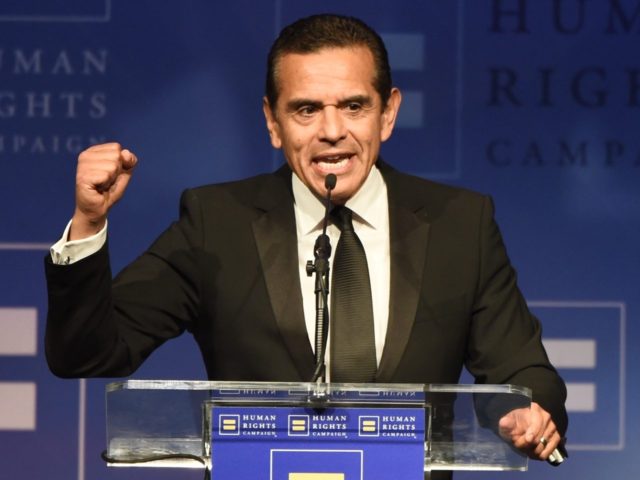Former Los Angeles mayor Antonio Villaraigosa is pursuing a pathway to the California governor’s mansion that would make him the first Latino governor since 1875 — but it depends on turning out the chronically underperforming Latino vote.
Releasing an internal phone poll last week of 601 likely California voters, conducted by Washington, D.C.-based Feldman Group Inc., Villaraigosa’s campaign is pushing the narrative that he is a strong contender at number three.
Coming in just behind unknown Republican John Cox (at 20%) — the lone Republican in the race at this point — Villaraigosa, 64, is claiming he garners 20% of the vote, not the paltry 11% other polls have shown.
Lt. Governor Gavin Newsom is in the lead at 26% in the Villaraigosa’s internal poll — and out-raising his closest opponent, California Treasurer John Chiang by two-to-one, with $11 million in the bank.
Villaraigosa’s website boldly claims, “NEW POLL SHOWS INCREDIBLE MOMENTUM—That means we are now within striking distance of a run-off position after just a few months in the race – a great starting point…[even though]…[f]ully 23 percent of respondents are still undecided.”
In a letter addressed to “Antonio for California,” Diane Feldman and Chad Arthur of the Feldman Group attempt to explain the result showing Villaraigosa with nearly twice the support of any other previous poll, but a closer look at these assumptions may spell bad news for the Villaraigosa camp.
“First, Villaraigosa was the only Latino candidate in this match-up, and leads formidably among Latino voters with 42 percent support to 19 percent for second-place Newsom.”
While it is understandable that Latino turnout might be weighted more heavily at 23% in his own poll, that may be wishful thinking, according to political experts.
“Latinos almost always underperform their registration,” said Paul Mitchell, one of the leading political statisticians in the state, according to the Sacramento Bee. “In California, they are 25 percent of the voters, but in the 2016 general election they were 22.6 percent of ballots cast. And in the primary, they were 20 percent. This underperformance is chronic, with only two examples I’ve found of Latinos overperforming registration.”
Neither of those examples involved a statewide race. Both were in Villaraigosa’s stronghold of Los Angeles, according to the Bee — in 2005, when he unseated incumbent Mayor James Hahn, and in 2006, when “current state Senate leader Kevin de León was first elected to the state Assembly.” In the densely-poulated San Francisco Bay area, where voters turn out in much higher percentages than Los Angeles county, Newsom crushes Villaraigosa.
“Second, the poll includes a sample of Latino voters who have not voted in prior primaries, but voted in general elections. … Overall Latinos make up 23% of our sample,” the pollsters add.
Basing poll results on an assumption that voters will change their behavior — without any significant trigger event — defies history and significantly undermines the validity of the poll results.
“Finally, and most importantly, a substantial portion of the California electorate is mobilized in opposition to Donald Trump and the policies he is promulgating…the Trump election has energized Democrats…” the pollsters say.
Many Republicans assumed that voters would turn out in droves to vote against President Obama in 2012, but that never happened. Conservative voters, uninspired by a lackluster candidate in Mitt Romney, failed to show up, and simply stayed home or refused to vote for Romney.
Without Trump on the ballot — and with a supermajority of Democrats controlling California already — it is unlikely that Villaraigosa will capture a significant enough portion of the vote to overcome Newsom on “anti-Trump” sentiment alone.
With voter registration falling in California for both major political parties (as Republicans dip under 26% and Democrats remain below 45% in the most recent numbers), and with voter turnout that can only be described as anemic, the 2018 contest is still a wide-open race at this point.
Tim Donnelly is a former California State Assemblyman and author who is doing a book tour for his new book: Patriot Not Politician: Win or Go Homeless. He ran for governor in 2014.
FaceBook: https://www.facebook.com/tim.donnelly.12/
Twitter: @PatriotNotPol

COMMENTS
Please let us know if you're having issues with commenting.